Culture Keeps Girls Ignorant
Afghan female baker Bibi Gul is the second in three generations of women in her family deprived of education documented for this story. Plucked out of school in 6th grade, she struggles to accept the same fate for her daughters.
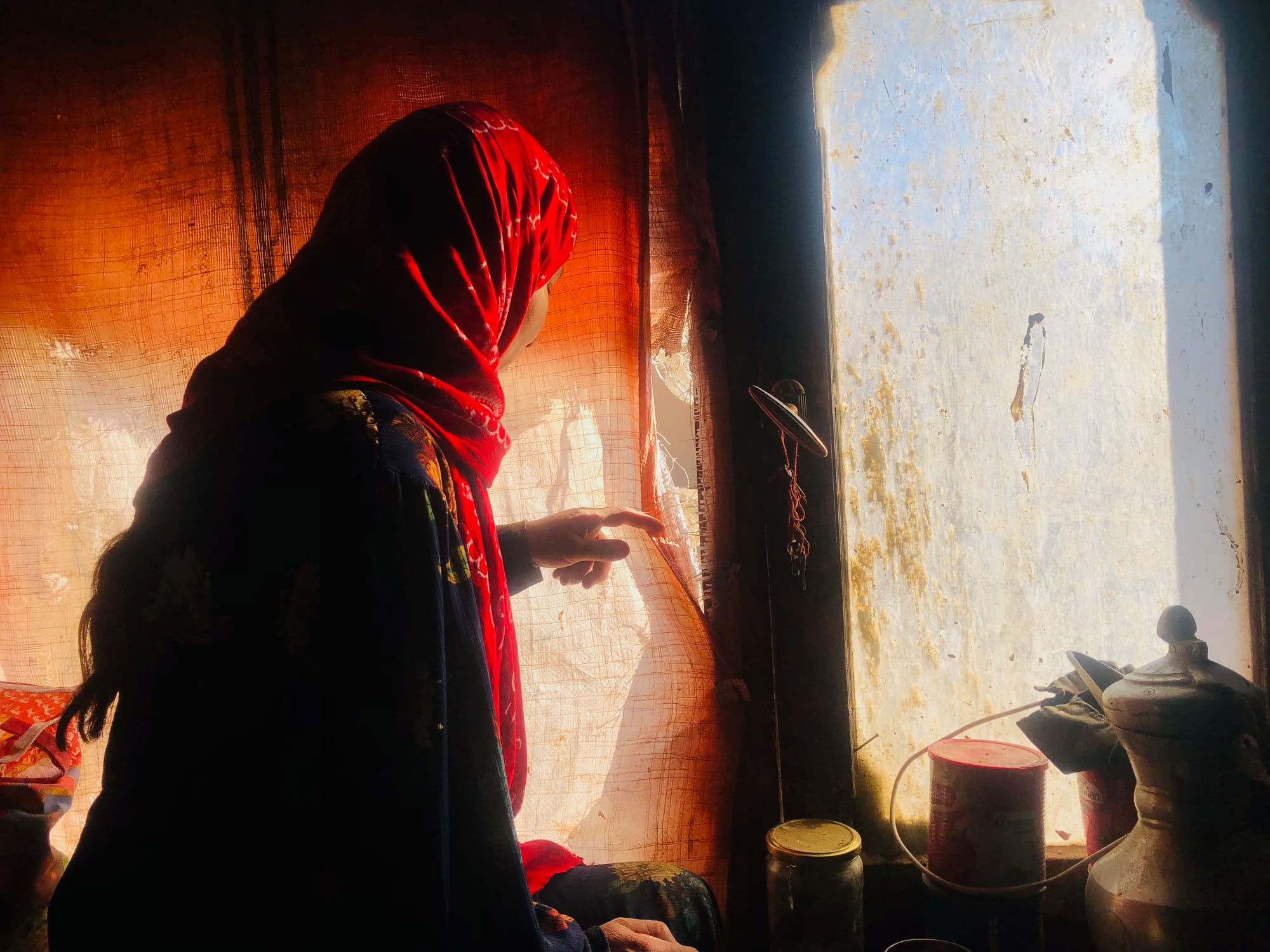
Written by Shabana Farahmand
Alive-in is a not-for-profit, community-supported media agency that helps journalists from underrepresented communities cover stories of local and global interest.
You can support our journalists by forwarding this newsletter to others who may value these stories and by donating at the link below.
This profile is part of a broader series exploring changes regarding access to education in Afghanistan, created with support from Afghan Witness (a project of the Centre for Information Resilience), which uses open-source investigating to expose human rights violations and counter mis- and disinformation. This series will incorporate open-source techniques to further corroborate the investigative reporting.
Bibi Gul, a 28-year-old woman (pseudonym), ceased her schooling around age 11, during the 5th grade, due to the presence of male teachers. Marrying at 17, she tragically lost her husband four years ago in a car accident, leaving her to support herself and her five children by baking bread.
In this episode of One Day in Afghanistan, Shabana Farahmand chronicles a day in Bibi Gul's life. Originally from Yaftal, a district in northeastern Badakhshan province, Bibi Gul relocated to the outskirts of the provincial capital Faizabad after her marriage.
As I set out, the morning air is brisk in Faizabad, the roads teeming with vehicles and commuters on foot starting their day. Conversing with taxi drivers, I navigate my way to Dara-e Naju, a valley northeast of Faizabad.
The driver tells me, "Part of the route is inaccessible by vehicles; you will have to walk."
I hop into the vehicle and head towards my destination until we reach the mouth of the valley, where I have to disembark. It’s 9:30 in the morning, and I still have two hours to walk to my destination, which is located north in a valley surrounded by mountains with steep climbs, switchbacks, narrow alleyways, and rugged terrain.
After walking most of the way, I arrive at a ridge overlooking the landmarks that resemble the address given to me by Bibi Gul. I follow the signs, soon finding Bibi Gul’s home.
FAIZABAD, BADAKHSHAN — 28 year-old Bibi Gul bakes bread to make ends meet, and speaks about her ordeal in childhood after she was denied schooling. She now struggles to accept the same fate for her daughters. Videos by: Shabana Farahmand
Bibi Gul’s home, like the other houses here, is a mud hut with two rooms located on a ridge. A little girl smiles as she sees me, then runs back inside to tell her mom that a guest has arrived. Her mother, Bibi Gul, comes out and greets me warmly. She is a woman with a medium build, fair skin, and a beautiful face, wearing a red flower-patterned veil that accentuates her beauty.
"I am Bibi Gul," she says. Bibi Gul has five children; her eldest child is 13-year-old Roshan Gul, who would have been in 7th grade had schools been open.
Girls have been barred from attending public schools after 6th grade in most of Afghanistan following the Taliban takeover of the country in August 2021. Bibi Gul attended school up to the fifth grade in the Yaftal district. In 6th grade, male teachers replaced female ones, and Bibi Gul's parents stopped allowing her to go to school.
"I finished 5th grade, then my family didn’t allow me to continue school. Male teachers came, replacing female ones. We were a total of 28 girls, none of us went to school after that," Bibi Gul says while wearing a black Niqab over her red scarf to hide her face and adhere to the Taliban’s dress code.
Sighing deeply, Bibi Gul continues, "When male teachers came to teach in our school, the villagers protested, asking 'why strangers came to our village to teach our girls. Either the teachers leave, or our girls will not go to school anymore.'"
Bibi Gul is referring to changes in education staffing in Badakhshan during the Islamic Republic, which saw female teachers replaced by male teachers. Alive-in/Afghanistan was unable to confirm the exact details surrounding the change in staffing.
"I went to school for a few days in 6th grade but had to leave school for good due to my parents harassing me and our neighbors talking," Bibi Gul says.
"Mardom chi mega - what will people say," is a famous saying in Afghanistan that dictates a person’s every move and action. People, especially women, in Afghanistan care a lot about the community's opinion of them, which at most times adds restrictions rather than removes them.
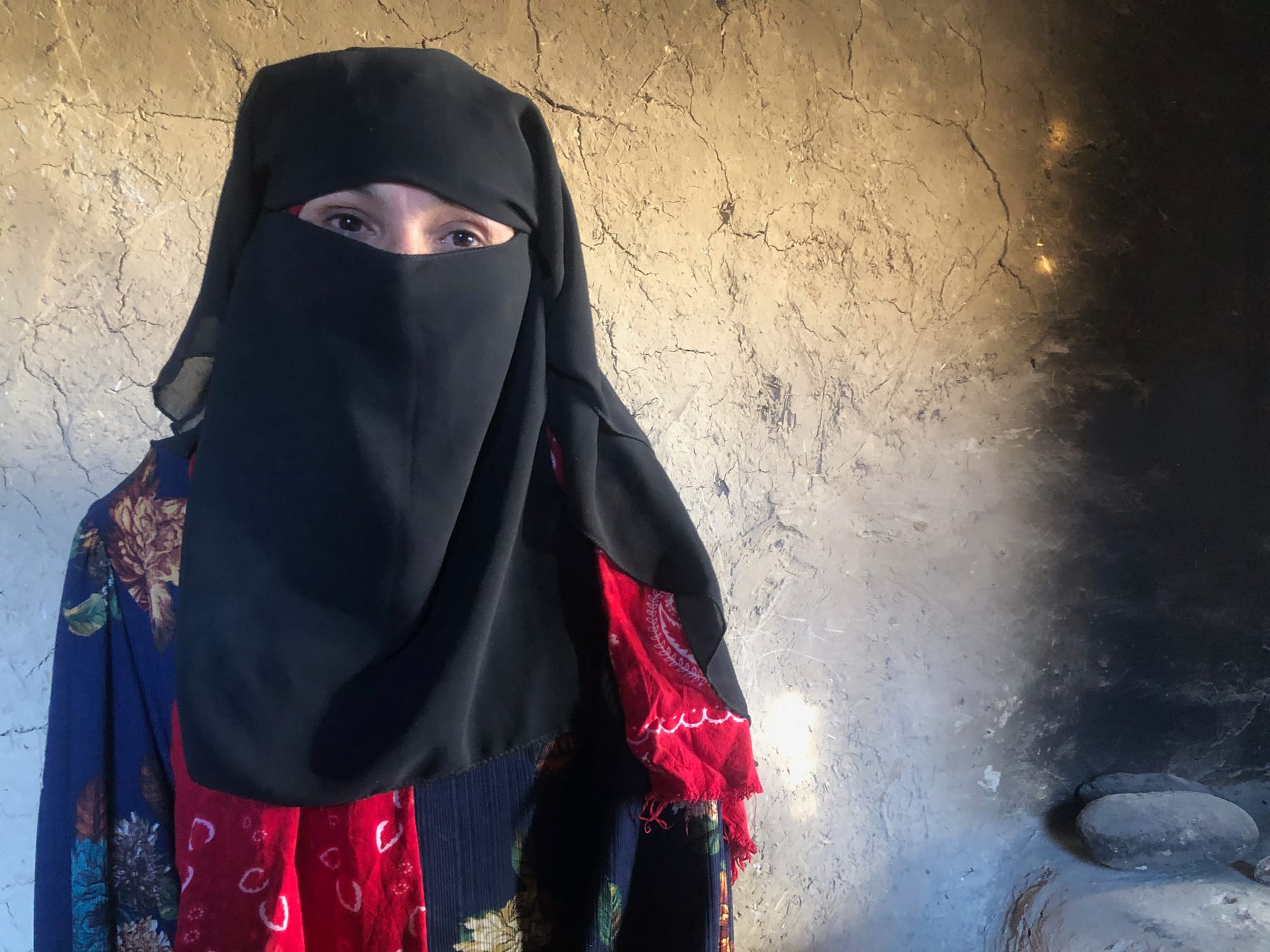
After a short interview, Bibi Gul starts baking bread, which is how she makes a living. It’s now 11:30 in the morning. Bibi Gul has been a baker for five years, supporting her family through this home-based business. She bakes bread for her neighbors, charging 6 Afghanis ($0.08) per piece of bread. The dough is made by the neighbors themselves; Bibi Gul just does the baking. Her usual workday is from 9 am to 4 pm.
Bibi Gul has four girls and one boy. She says, “I want them to study so they can have a better life. That is my hope.”
Engrossed in conversation, I don’t realize the passing of time until Bibi Gul offers lunch, eggs sunny-side up, served with tea and freshly baked bread. We enjoy lunch together, sitting by the warm bread oven provides a cozy atmosphere in the middle of a cold winter. Bibi Gul’s mom, 67-year-old Chaman Gul, also joins us for lunch.
According to Chaman Gul, there were no schools in Kohistan district, her hometown, when she was a child. Chaman Gul was forcibly married to an older married man when she was only 11, becoming his second wife.
Chaman Gul, a frail woman with a wrinkled face, wears a black niqab while being interviewed. “My father married me to a man with white hair. No one in our area was educated at the time, and there was no school in our village. My father was poor and wanted us to marry as soon as possible and move on with our lives,” Chaman Gul says.
After marriage, she moved to a new district which in 1967 also had no schools, not that her husband would allow her to attend if there was one. “People didn’t know what a school was or what it meant to study. People only read the Quran, that was it. After my daughter (Bibi Gul) became six years old, a school finally opened, and I enrolled my daughter.”
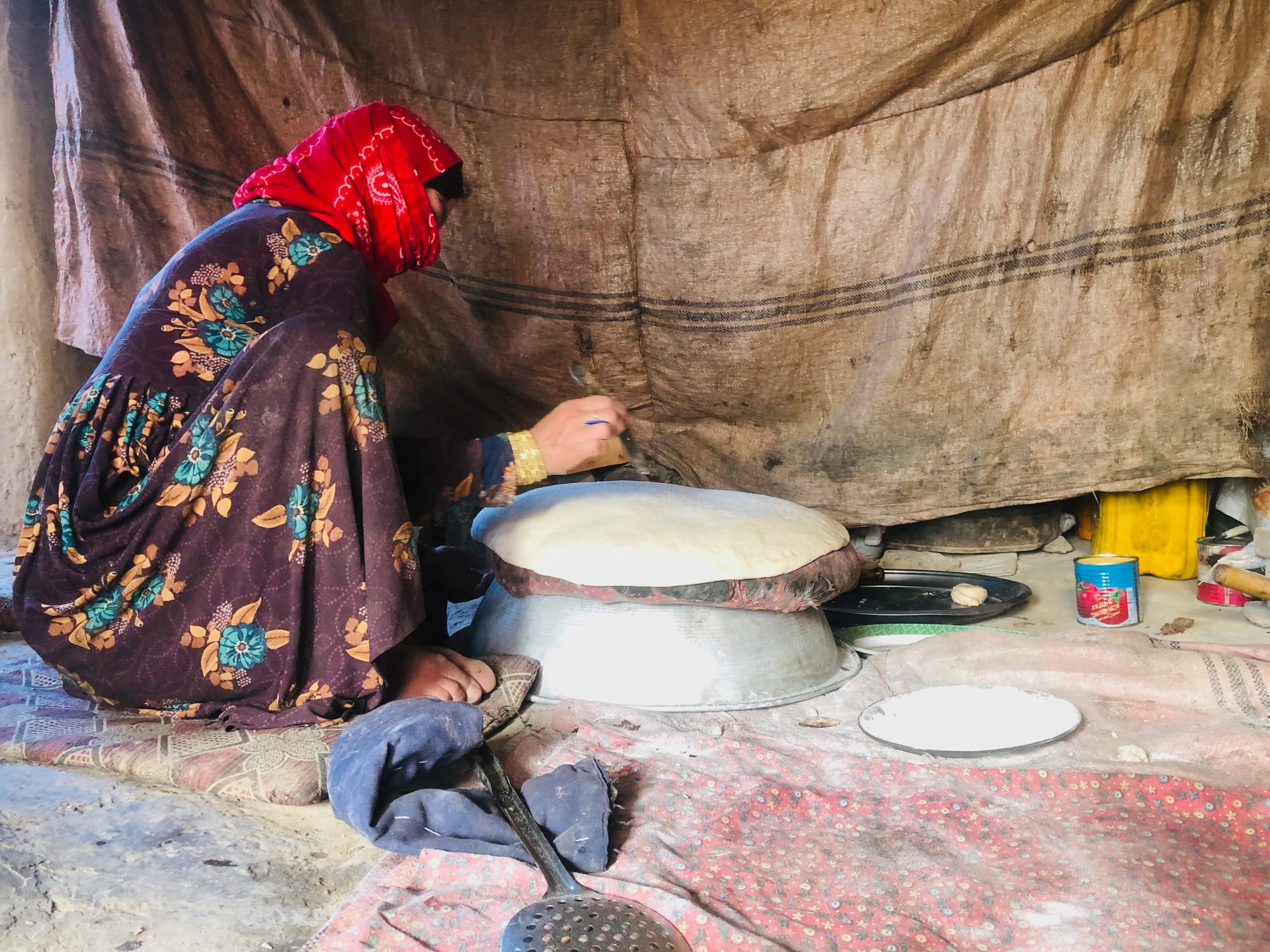
But when male teachers replaced female ones at their village school, Chaman Gul had no say in pulling her daughter out of school. Her husband and Bibi Gul’s father had the upper hand, with community pressure helping the process.
Chaman Gul’s own life was filled with domestic violence, her husband, his first wife, and Chaman Gul’s mother-in-law beat her often. “After getting married, my husband, his first wife, and my mother-in-law would wake me up at 5 am every morning. I would take the livestock to pasture and come back at 6 in the evening. When I returned home, I was always anxious because I had to watch over the livestock and make sure they didn't harm each other. My precious life passed in the mountains, valleys, and the animal pen, filled with sorrow!"
According to Chaman Gul, misogynist behaviors and domestic violence are due to illiteracy. “If my husband and his wife were literate, they would have never behaved like that.”
The only good time in her life, according to Chaman Gul, was her childhood. Everything else is full of bad memories.
“I spent my days in the desert taking care of animals. If I didn’t do it, my husband, his first wife, and my mother-in-law would hit me with anything they could get their hands on. If livestock died, they blamed me. I didn’t have an appetite due to the overwhelming level of oppression,” Chaman Gul says.
Ms. Gul now lives with her daughter, her only child.
I receive an interesting response when I ask Chaman Gul about her hopes and dreams. “What hope or dream can a 67-year-old woman have? I have none. I buried my hopes in my father’s house after I was married off at 11. I only hope that God saves my daughter for me and fulfills her wishes.”
Chaman Gul constantly talks about her daughter's poor economic condition and how she struggles through life.
I become so engrossed in Chaman Gul's stories that my bread and tea turn cold, but her wistful gaze touches one's heart. It's time for the noon prayer. We all pray together. Then Bibi Gul has lunch with me, which she misses often because most days she can’t eat on time due to work.
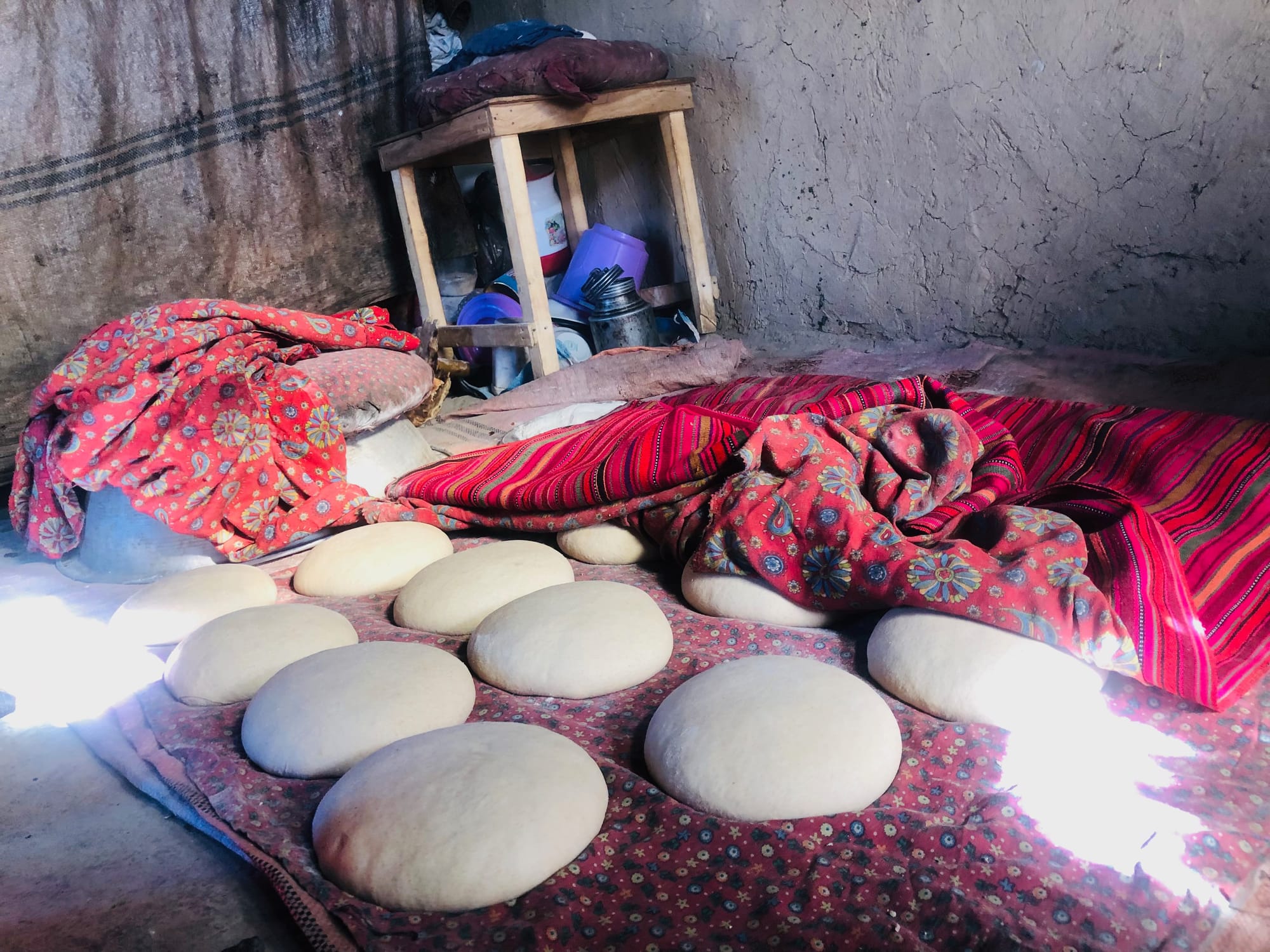
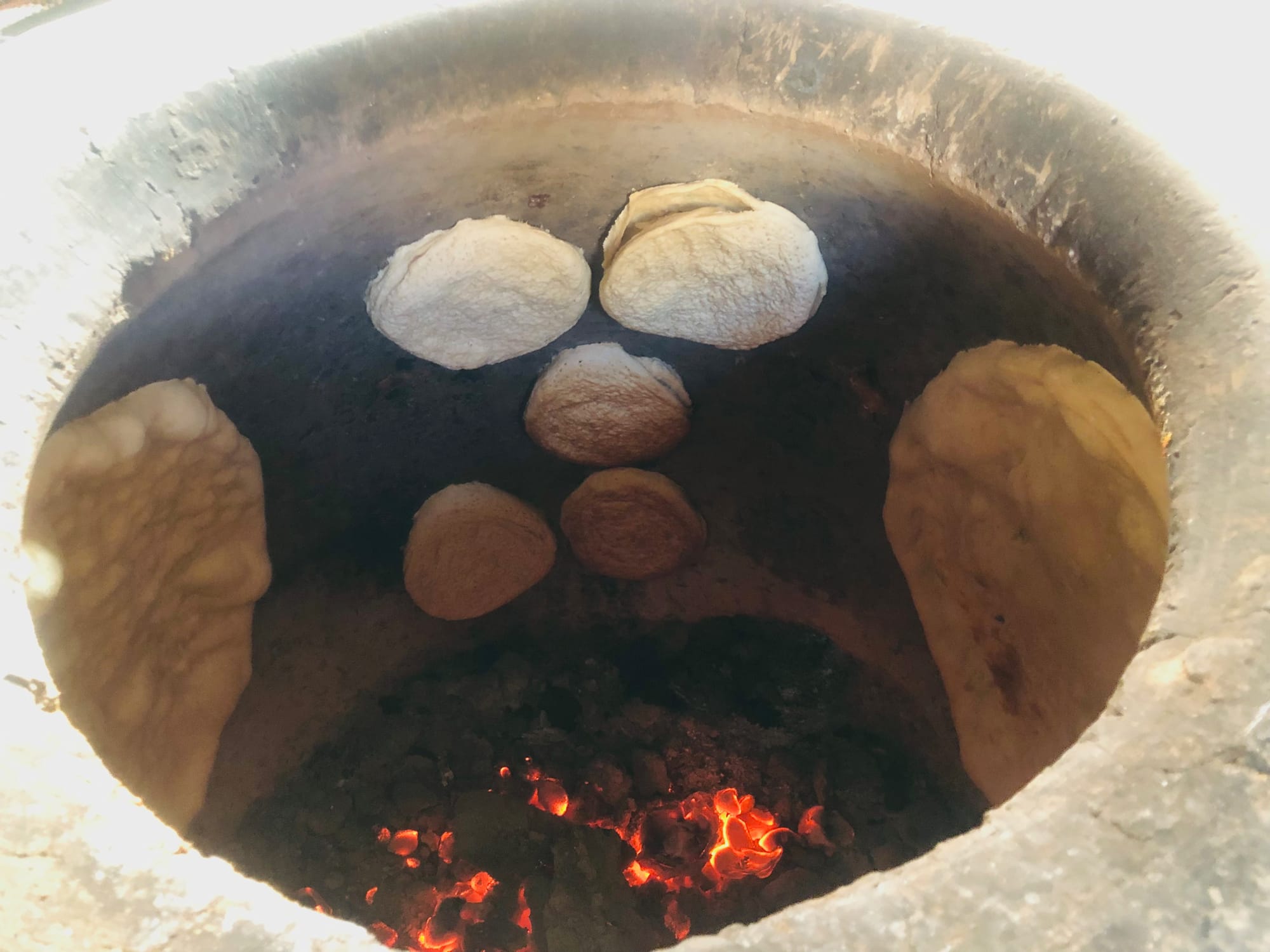
FAIZABAD, BADAKHSHAN — (left) a stack of dough balls ready to be made into flatbreads and cooked in the oven to the right. The dough is stuck to the sides of the oven where it cooks until it turns golden brown. Photo by: Shabana Farahmand
After performing the noon prayer, Bibi Gul returns to her baking. Meanwhile, 50-year-old Halima, a tall woman in a green floral dress, enters Bibi Gul’s kitchen.
Halima is beautiful, the wrinkles on her face tell the story of passing time. She is one of Bibi Gul's longtime customers.
Halima places the tray of dough covered with a thick cloth to prevent dust from getting inside on the ground before sitting down. She removes the cloth and begins making dough balls.
Halima is originally from Badakhshan’s Kishm district, and her story resembles that of Chaman Gul and countless other women of their age range. “There was no school in our village at the time.”
It’s now 2 pm. Bibi Gul starts flattening and shaping the dough balls Halima has made on a bread pad, then sprinkles some water on the dough before lowering the pad with the raw dough on top into the oven, slapping it on the side of the hot oven.
It takes half an hour for Halima’s order to bake, with her gathering the hot, fresh bread Bibi Gul takes out of the oven and stacking them on top of each other one by one.
Once her order is done, Halima bids goodbye and leaves.
I ask Bibi Gul about her life and memories from the past. In response, she says, "After ten years of marriage and five children, my husband took a second wife. This is the most bitter memory of my life. Life became meaningless after that.”
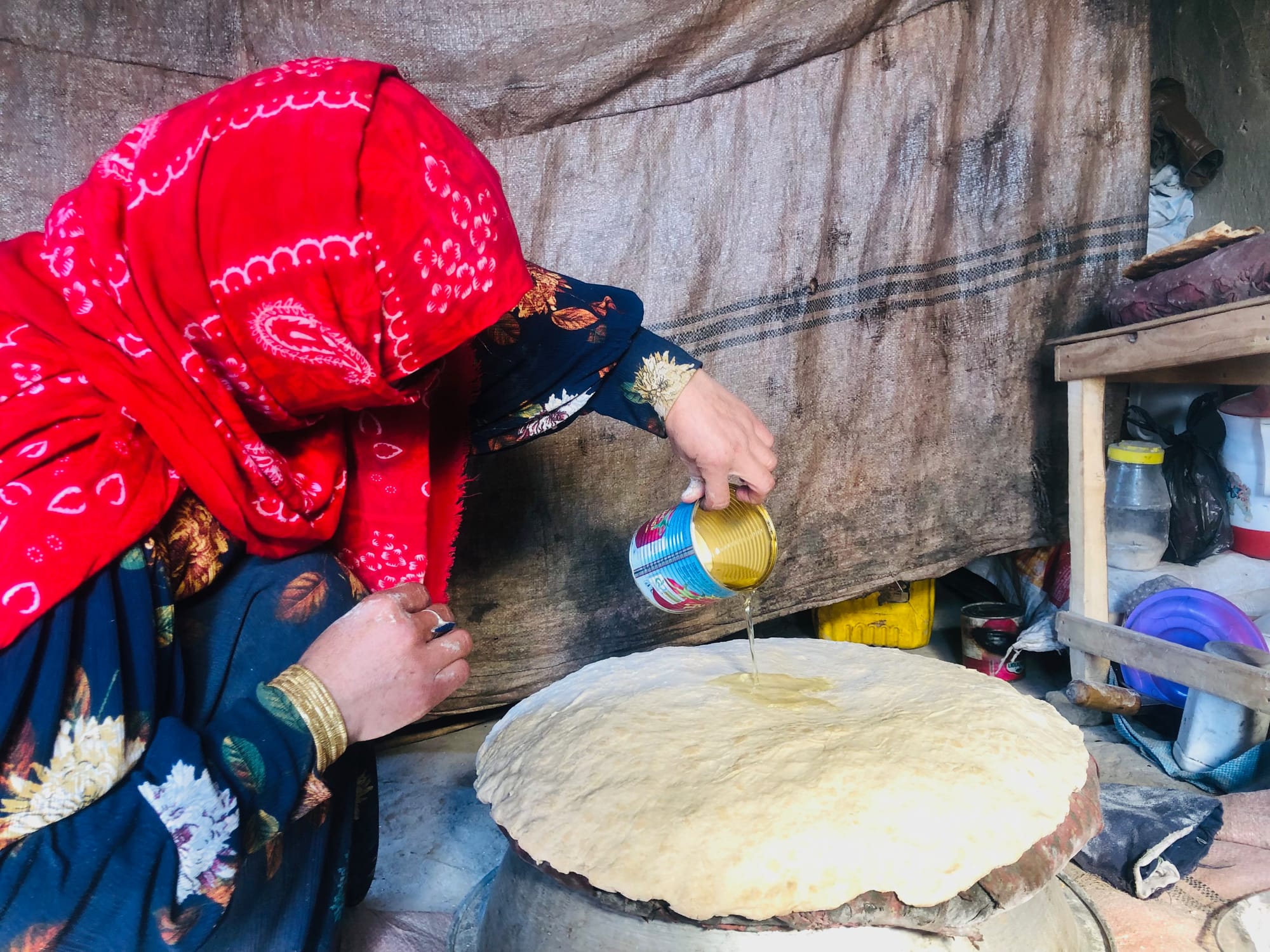
Fighting back tears, Bibi Gul continues, “Two years after remarrying, my husband died in a car crash, making me a widow. My life is full of bitter and heartbreaking memories; I have no good memories!”
The dam she had been holding back bursts, the pool of tears flowing out of her eyes as she sobs. I try to calm her down, but it takes several minutes until she is able to stop crying, making me teary-eyed as well.
No words are spoken, and Bibi Gul gets back to baking once her tears dry up. Trying to change the subject, I ask why she makes bread using oil, different from normal bread.
“This is for selling,” Bibi Gul replies. In addition to baking bread for her customers, Bibi Gul bakes bread to be sold locally.
“My children take the bread and sell them for 10 Afghanis ($0.14) a piece. The more oil there is in the dough, the tastier the bread,” Bibi Gul says.
While busy making bread to sell, Bibi Gul recalls another sad, yet interesting story about her daughters and their education following the Taliban takeover of Afghanistan in August 2021.
“Roshan Gul was in the 7th grade when schools closed. She was the top of her class in every grade. After a month of the closure, Roshan convinced her sister, who was then in 4th grade, to let [Roshan] go to school in her place. Roshan would cover her face to avoid recognition. The teachers realized she was not Nazi Gul in about a month and told her she couldn’t go anymore. This made me very sad; the saddest moment in a mother’s life is when she cannot fulfill her children’s wishes.”
Nazi Gul went back to school after her sister was told she couldn’t go in her place.
"My biggest wish is for my children to study and become someone. We didn't study and didn't get anywhere. Our lives revolved around hard work, but I want my children to study and achieve something. As a mother, I will do everything in my power to make that happen,” Bibi Gul says, determined in her statement.
But it’s unclear how she will do that with the state against her.
